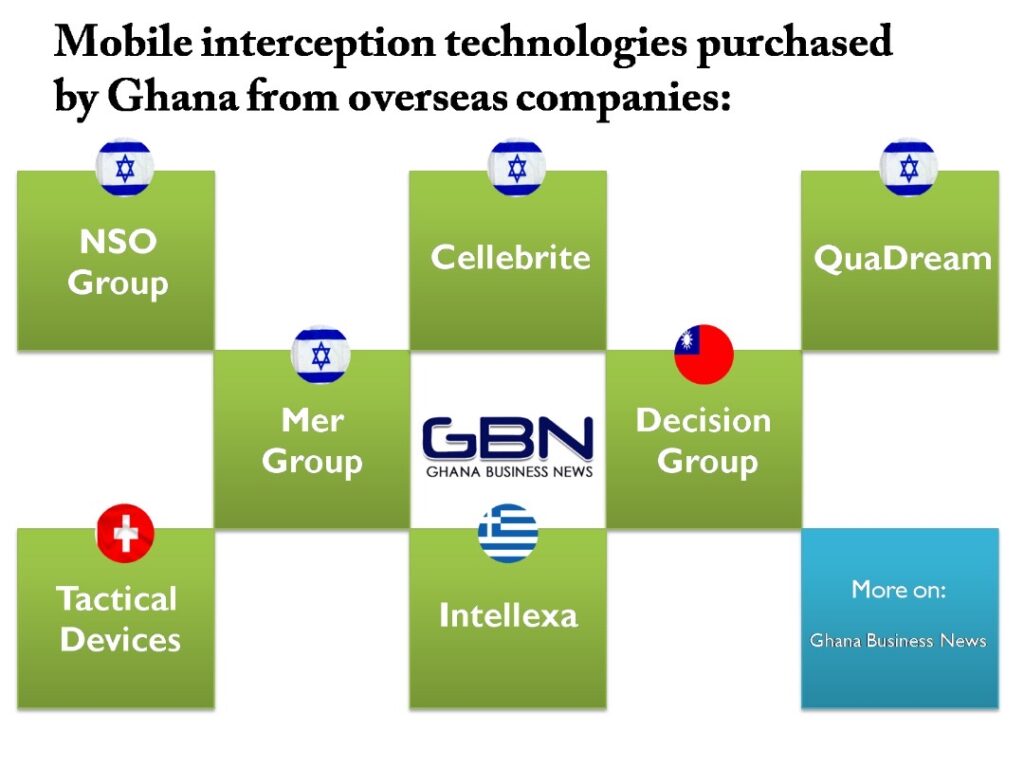How Ghana acquired five kinds of spyware under cloak of secrecy

Ghana government officials have continued to remain silent over information that the country has acquired spyware to snoop on citizens, despite the global outrage that has followed revelations about the use of some spyware against journalists, critics and political opponents by governments around the world.
It is known that Ghana has acquired five different kinds of spyware with varying degrees of capabilities from overseas companies, and there is evidence that these technologies are being used in the country to spy on citizens.
The editor of a research based on open-source data titled; ‘Mapping the supply of surveillance technologies to Africa: Ghana country report’, that was published by the Institute of Development Studies, Tony Roberts, has told Ghana Business News in response to questions about the study that the report shows that Ghana has procured five kinds of surveillance technologies.
These technologies, he said are capable of: Internet interception; mobile interception and social media monitoring. The others are safe city public space surveillance technologies, and biometrics digital-Id technology.
Asked about specific companies and their origins from which Ghana has obtained these surveillance technologies, he said, the mobile spyware providers included four Israeli companies, NSO, Cellebrite, QuaDream and Mer Group.
“Ghana has sourced other surveillance technologies from the US, Switzerland, Greece, Taiwan and China,” he added.
“When viewed together, it is clear that the government is expanding its surveillance of citizens and that it is doing so without adequate public debate, robust legislation, or independent oversight,” he said.
Dr Gifty Appiah-Adjei, one of the authors of the report, provided more details indicating that Ghana has purchased mobile interception technologies from the following overseas companies: NSO Group, Cellebrite, QuaDream and Mer Group, all of Israel. The others are Decision Group of Taiwan, Tactical Devices of Switzerland, and Intellexa of Greece.
“The CCTV component of the smart city project is powered by Huawei from China,” she said.
On the extent of usage of these technologies on citizens in Ghana, Roberts indicated that the report maps out a range of surveillance technologies that have been procured by the government of Ghana from a range of companies and countries.
“When viewed together, it is clear that the government is expanding its surveillance of citizens and that it is doing so without adequate public debate, robust legislation, or independent oversight,” he said.
Dr Appiah-Adjei notes: “Regarding Internet interception, we did not find any evidence in secondary data but the fact that an existing law creates a legal obligation for Internet service providers to install interception technology and to retain the content of citizens’ communications and metadata for several years to facilitate access by state agencies means Internet interception technologies are being used in Ghana.”
While the global community has consistently expressed concerns about the growing use of spyware by governments, in Ghana there is very little awareness or discussions about the issues, despite several reports on the matter by Ghana Business News for some time now.
Not even the fact that this year, 2024 is an election year, and a potential period where there could possibly be increased surveillance, has triggered any public debate on the subject in the country.
But not so among international civil society organisations.
“Civil society organisations are increasingly concerned that the right to privacy of communication and correspondence guaranteed in national constitutions, international law, and in domestic legislation is being violated by state surveillance and that governments are violating citizens’ rights with impunity. Reporters Without Borders cited two cases in which Ghanaian journalists were either arrested or imprisoned over their social media posts.
The secrecy surrounding the use of surveillance technologies makes it difficult to accurately measure the impact of their use, but the report includes accounts of individuals who have been targeted and the harm caused,” Roberts said.
While the global community has consistently expressed concerns about the growing use of spyware by governments, in Ghana there is very little awareness or discussions about the issues, despite several reports on the matter by Ghana Business News for some time now.
Dr Appiah-Adjei commenting on the possibility of the usage of these surveillance technologies in Ghana further states that evidence from a follow-up research on experiences of illegal digital surveillance on journalists and political rights activists shows that these technologies are being used to monitor journalists, especially investigative journalists, as well as political rights activists.
Citing the intelligence system Ghana inherited from the British colonial state, the report notes that those historical trajectories point to the likelihood of independent Ghana using its intelligence-gathering agencies for citizen surveillance.
It however states that despite that, Ghana’s democratic profile has remained stellar compared to most African democracies.
The report further acknowledged Ghana’s outstanding democratic credentials citing reports that ranked the country high, compared to other countries in Africa. Ghana’s standing on rule of law was also noted in the report.
 However, despite the relatively positive outlook, Ghana has recently witnessed a slight regression in its rankings, the report said.
However, despite the relatively positive outlook, Ghana has recently witnessed a slight regression in its rankings, the report said.
Its Rule of Law Index decreased by 2.2 per cent in 2021 and its Freedom House Ranking dropped by two points in 2022. Its Internet Freedom Ranking has been consistently ranked ‘partly free’ for the past five years (Freedom House 2022).
On a closer look, it can be seen that what is going wrong with rights and freedom in Ghana did not start in just those five years. Freedom of expression and the right to privacy have been compromised for some time, the report noted.
The report also took note of the increase in leaked tapes of personal conversations around a period and indicated that these cases of leaked tapes of personal, confidential conversations involving highly placed politicians of ruling and opposition parties, while the means through which they were recorded remains largely unknown, and interested parties to the leaked conversations have questioned their authenticity in some cases, illegal surveillance cannot be ruled out.
“As its positive democratic ratings are decreasing, so Ghana’s cases of human rights abuse are increasing. There are documented cases of arbitrary arrests and excessive use of unnecessary force against journalists, civil society actors, and protesters,” the report said.
Listing some cases, the report said in February 2021, Ibrahim Mohammed, an activist in the Ashanti Region, was attacked by assailants and died two days later. In February 2022, Oliver Barker-Vormawor, founder of the #FixTheCountry protest movement, was arrested, imprisoned for two months, and had his passport confiscated. In June 2022, 29 Arise Ghana protesters were arrested by the police, while a combined force of the police and the military shot dead two protesters and wounded four others at Ejura Sekyedumase in the Ashanti Region.
“These growing cases of intolerance for dissent coincide with the government’s increased possession of surveillance technologies and citizens’ private data. Amidst growing concern about human rights violations, Ghanaian and foreign media houses have published stories alleging that Ghana has taken possession of and used surveillance technologies to spy on its citizens in recent years,” it added.
The report says Ghana is among countries implementing the safe city project powered by Chinese Huawei artificial intelligence (AI), and Ghana’s Cybersecurity Act, passed in 2020, makes it legal for the government to conduct surveillance on citizens and retrieve data from the country’s mobile network service providers in the interest of what it vaguely describes as “national security”.
The authors of the report found that there is silence around the procurement of the technologies.
“The secrecy surrounding the procurement and use of surveillance technologies in Ghana makes it difficult to measure the impact of their use for illegal purposes. Nevertheless, knowledge of the government of Ghana’s surveillance capability has created a sense of siege among activists, journalists, and opposition politicians,” they said.
Dr Appiah-Adjei however recommends that there should be training and capacity building on the subject to raise awareness, advocacy, and train journalists and activists to be digitally competent to resist illegal digital surveillance.
She also called on the international community to support research on experiences of illegal digital surveillance.
“The opinions and experiences of victims of illegal surveillance are sources of rich data for raising awareness about the illegal use of these surveillance technologies to violate people’s right to privacy and secure communication,” she added.
By Emmanuel K Dogbevi
Copyright ©2024 by NewsBridge Africa
All rights reserved. This article or any portion thereof may not be reproduced or used in any manner whatsoever without the express written permission of the publisher except for the use of brief quotations in reviews.

First of all #Kudos to Emmanuel on his dogged resilience to economic pressures ,how he has kept Ghanabusinessnews.com running without the financial security he deserves is beyond my comprehension.
On to the matter at hand and and a necessary #conversation on #civilliberties and #democracy #Ghana
In the rush towards digitalization and technological advancement, Ghana finds itself at a critical juncture where the balance between security, freedom of speech, and civil liberties hangs in precarious balance. Recent reports by #GhanaBusinessNews have shed light on the acquisition of mobile interception technologies from various overseas companies, raising concerns about the potential erosion of privacy rights. Among the companies involved are NSO Group, Cellebrite, QuaDream, Mer Group of Israel, Decision Group of Taiwan, Tactical Devices of Switzerland, and Intellexa of Greece.
This influx of mobile interception software poses a significant threat to the privacy and security of Ghanaian citizens. The potential for abuse, surveillance, and infringement upon the right to privacy is evident, with the capacity for state or non-state actors to monitor communications without proper oversight or accountability.
Furthermore, the vulnerabilities in mobile money platforms exacerbate the risks. The accessibility of account holder information through these platforms raises serious concerns about identity theft and personal data protection. The ease with which one can obtain personal information simply by pretending to send money underscores the inadequacies in safeguarding sensitive data.
Moreover, the proliferation of one-time password bots, both on the dark web and developed by individuals, further compounds the security challenges faced by Ghanaians. These bots pose a direct threat to the integrity of digital transactions and the protection of personal information.
In the midst of this digital revolution, it is clear that Ghana has fallen short in ensuring the necessary safeguards to protect its citizens’ rights and liberties. The lack of comprehensive regulatory frameworks, oversight mechanisms, and robust cybersecurity measures leaves individuals vulnerable to exploitation and abuse.
As Ghana continues on its path towards digitalization, it is imperative that the government and relevant stakeholders prioritize the protection of citizens’ privacy, security, and civil liberties. This requires concerted efforts to strengthen regulatory frameworks, enhance cybersecurity capabilities, and promote transparency and accountability in the deployment of digital technologies. Failure to do so risks undermining the very foundation of democracy and individual freedoms in Ghana.
This write up was instigated by a few , well more than a few posts about the sorry state of #Journalism in #Ghana and fits into my advocating for #socialengineering needed here if indeed we want to #bethechangeyouwanttosee, that being #engagement , specifically on web sites such as Ghana Business News , the conversation cannot be in one room such as Facebook , so actively seek sites that you deem credible and comment there as well.
Musing at dawn to express an #Opinion Julius RK Sowu from #Tegbi 2024